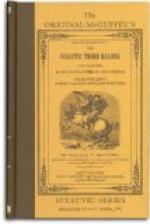29. A. No, papa; this has little flat seeds instead of flowers.
30. F. Very right, my dear. Now, in order to make those seeds grow, it is necessary that the little flower of this plant and the seed of that should be together, as they are in most others. But plants can not walk, like animals. The wisdom of God, therefore, has provided a remedy for this. When the little flower bursts open it throws out a fine powder, which you saw rise like a cloud; this is conveyed by the air to the other plant, and when it falls upon the seed of that plant it gives it power to grow, and makes it a perfect seed, which, in its turn, when it falls to the ground, will produce a new plant. Were it not for this fine powder, that seed would never be perfect or complete.
31. A. That is very curious, indeed; and I see the use of the little cloud and the flower; but the leaf that stung me, of what use can that be? There, dear papa, I am afraid I puzzle you to tell me that.
32. P. Even these stings are made useful to man. The poor people in some countries use them instead of blisters, when they are sick. Those leaves which do not sting are used by some for food, and from the stalk others get a stringy bark, which answers the purpose of flax. Thus you see that even the despised nettle is not made in vain; and this lesson may serve to teach you that we only need to understand the works of God to see that “in goodness and wisdom he has made them all.”
Definitions.—12. Mag’ni-fy-ing glass, an instrument used to make objects appear larger. 17. En-chant’ment, magic art, witch-craft. 5. A-sun’der, apart, into parts. 30. Rem’e-dy, that which removes an evil. Con-veyed’, carried. 32. String’y, full of strings.
XLV. THE TEMPEST. (125)
By James T. Fields (born 1817, died 1881), who was born at Portsmouth, N. H. He was a poet, and the author, also, of some well known prose works. Of these, his “Yesterdays with Authors” is the most noted.
1. We were crowded in the cabin;
Not a soul would dare
to sleep:
It was midnight on the waters,
And a storm was on the
deep.
2. ’T is a fearful thing in winter
To be shattered by the
blast,
And to hear the rattling trumpet
Thunder, “Cut
away the mast!”
3. So we shuddered there in silence,
For the stoutest held
his breath,
While the hungry sea was roaring,
And the breakers threatened
death.
4. And as thus we sat in darkness,
Each one busy in his
prayers,
“We are lost!” the captain
shouted,
As he staggered down
the stairs.
5. But his little daughter whispered,
As she took his icy
hand,
“Is n’t God upon the
ocean,
Just the same as on
the land?”
6. Then we kissed the little maiden,
And we spoke in better
cheer;
And we anchored safe in harbor
When the morn was shining
clear.




